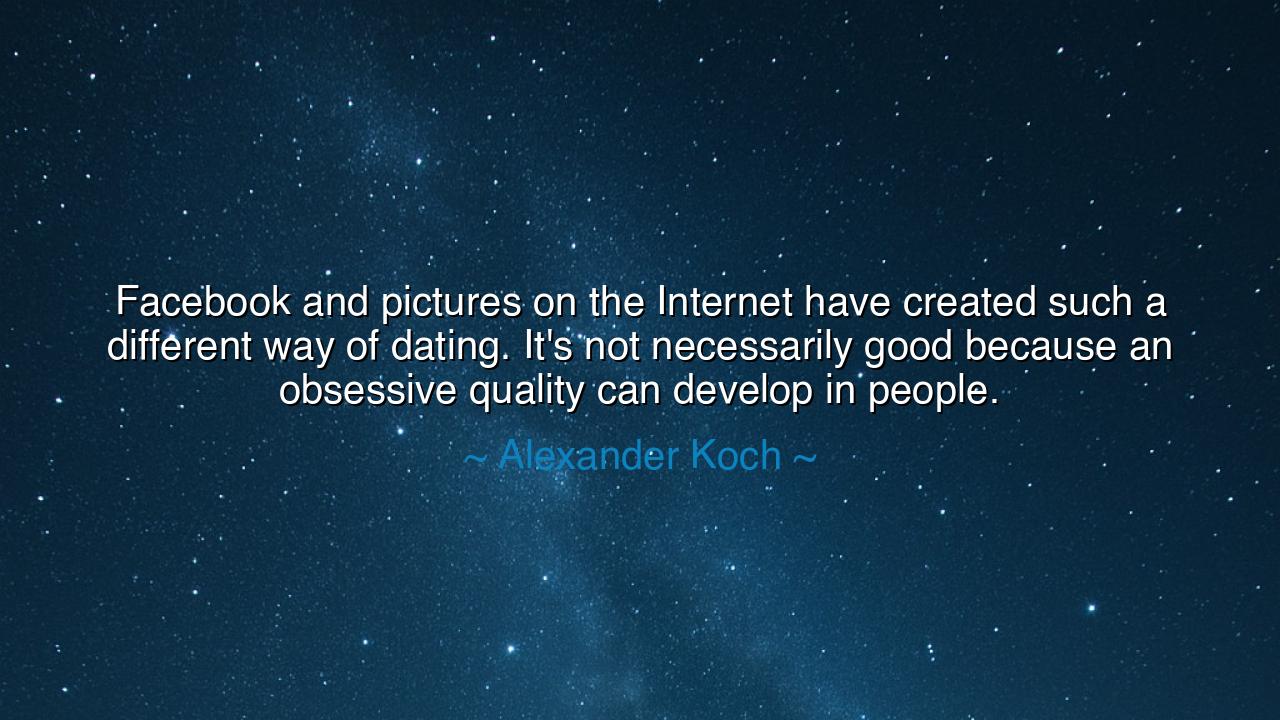
Facebook and pictures on the Internet have created such a
Facebook and pictures on the Internet have created such a different way of dating. It's not necessarily good because an obsessive quality can develop in people.






In the thoughtful words of Alexander Koch, we hear a warning born of the modern age: “Facebook and pictures on the Internet have created such a different way of dating. It’s not necessarily good because an obsessive quality can develop in people.” His words, though spoken softly, carry the weight of prophecy. For he speaks not merely of romance, but of the shifting tides of human connection — of how the glowing screen has replaced the human gaze, and how the mirror of technology reflects both our beauty and our madness. What he names as “obsession” is the sickness of a world where love has become spectacle, and affection is counted not in hearts, but in clicks.
In ancient days, love was a sacred fire — tended slowly, guarded fiercely, and shared through presence. It was the meeting of two souls beneath the open sky, a song whispered between hearts that had learned to wait. But in this new age, the image has replaced the essence. We no longer fall in love with the person before us, but with the shadow of who we imagine them to be — filtered, cropped, and curated for admiration. What was once real has become performance. And as Koch warns, this new theater of affection breeds obsession — for we begin to hunger, not for the other’s heart, but for their attention.
To understand the depth of this warning, one must recall the story of Narcissus, the beautiful youth of Greek myth who fell in love with his own reflection. Gazing into the still water, he mistook the image for another, and could not look away. In time, his desire consumed him, and he withered beside the pool, unable to distinguish illusion from truth. So too, in our digital age, many have become modern Narcissi — staring endlessly into the glowing pool of screens, enamored with the reflection of others, or of themselves. We scroll and scroll, seeking connection, yet sink deeper into isolation. The obsession Koch speaks of is not just romantic — it is spiritual, a longing for something real in a world of endless images.
There is a tragedy in this, for the heart that is always watching cannot listen. The soul that chases the next image cannot rest. Social media, though it promises intimacy, often delivers emptiness — a hall of mirrors where the self multiplies but never deepens. A man may think he knows a woman because he has seen her pictures, her smiles, her words framed in captions — yet he knows nothing of her silences, her laughter when unobserved, her fear of the dark, her scent after rain. The image deceives by making the shallow seem deep, and the known seem known when it is not. Thus, the obsessive quality arises — we begin to fill the gaps with fantasy, mistaking imagination for intimacy.
But there is also a deeper current beneath Koch’s warning: a yearning for the return of authentic connection. For when he says that this new way of dating is “not necessarily good,” he implies that humanity is at a crossroads. We have gained speed but lost stillness; we have gained visibility but lost vulnerability. True love, like true wisdom, cannot be rushed or edited. It requires patience, imperfection, and the courage to see and be seen without disguise. The ancients would say that love is a sacred mirror — but today’s mirrors are too bright, too polished, too false.
Consider the tale of Penelope and Odysseus. For twenty years she waited for her husband’s return, fending off suitors and weaving by day what she unraveled by night. Her love endured not through constant communication, but through faith and presence in absence. Imagine if their love had been lived through social media — his face on a screen, her patience worn thin by constant updates. Would their bond have survived? Unlikely. For their strength lay not in the display of love, but in its quiet endurance.
Thus, let the lesson of Alexander Koch’s words be this: do not mistake exposure for intimacy, nor attention for affection. What is seen is not always what is true. The digital world can enhance connection, but it can also erode the sacred mystery that gives love its power. Guard your heart against the endless gaze of the screen. Seek the warmth of real eyes, the tremor of real voices, the imperfect touch of real hands.
Action to take: Step away from the mirror-world. When you love, love with your whole presence — not through posts, but through patience. When you seek another, seek not their image but their truth. Speak face to face; listen without distraction. Remember that the heart, unlike the screen, does not need to refresh to feel alive. For in the end, it is not the image that saves us, but the encounter — two souls meeting in honesty, beyond the illusion of perfection, in the ancient and eternal art of being human.






AAdministratorAdministrator
Welcome, honored guests. Please leave a comment, we will respond soon